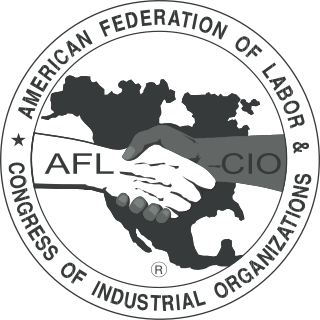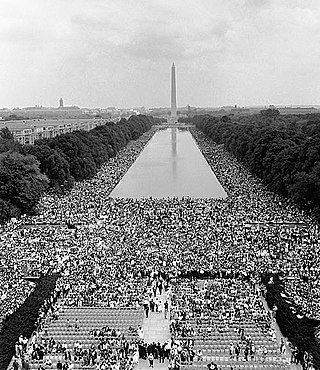
Bayard Rustin was an American political activist, a prominent leader in social movements for civil rights, socialism, nonviolence, and gay rights. Rustin was the principal organizer of the March on Washington for Jobs and Freedom in 1963.

The American Federation of Labor and Congress of Industrial Organizations (AFL-CIO) is a national trade union center that is the largest federation of unions in the United States. It is made up of 60 national and international unions, together representing more than 12 million active and retired workers. The AFL-CIO engages in substantial political spending and activism, typically in support of progressive and pro-labor policies.

Social Democrats, USA (SDUSA) is a social-democratic organization established in 1972 as the successor of the Socialist Party of America (SPA). The SPA had stopped running independent presidential candidates and consequently the term "party" in its name had confused the public. Moreover, replacing the "socialist" label with "social democrats" was meant to disassociate the group from the Soviet Union.

Asa Philip Randolph was an American labor unionist and civil rights activist. In 1925, he organized and led the Brotherhood of Sleeping Car Porters, the first successful African-American-led labor union. In the early Civil Rights Movement and the Labor Movement, Randolph was a prominent voice. His continuous agitation with the support of fellow labor rights activists against racist labor practices helped lead President Franklin D. Roosevelt to issue Executive Order 8802 in 1941, banning discrimination in the defense industries during World War II. The group then successfully maintained pressure, so that President Harry S. Truman proposed a new Civil Rights Act and issued Executive Orders 9980 and 9981 in 1948, promoting fair employment and anti-discrimination policies in federal government hiring, and ending racial segregation in the armed services.

The March on Washington for Jobs and Freedom, also known as simply the March on Washington or the Great March on Washington, was held in Washington, D.C., on August 28, 1963. The purpose of the march was to advocate for the civil and economic rights of African Americans. At the march, final speaker Dr. Martin Luther King Jr., standing in front of the Lincoln Memorial, delivered his historic "I Have a Dream" speech in which he called for an end to racism and racial segregation.
The Communist Party (CP) and its allies played a role in the United States labor movement, particularly in the 1930s and 1940s, but largely wasn't successful either in bringing the labor movement around to its agenda or in converting their influence in any particular union into membership gains for the Party. The CP has had only negligible influence in labor since its supporters' defeat in internal union political battles in the aftermath of World War II and the Congress of Industrial Organizations's (CIO) expulsion of unions in which the party held the most influence in 1950. The expelled parties were often raided by stronger unions, and most withered away.

Founded in 1925, The Brotherhood of Sleeping Car Porters and Maids, commonly referred to as the Brotherhood of Sleeping Car Porters (BSCP), was the first labor organization led by African Americans to receive a charter in the American Federation of Labor (AFL). The BSCP gathered a membership of 18,000 passenger railway workers across Canada, Mexico, and the United States.

William George Meany was an American labor union leader for 57 years. He was the key figure in the creation of the AFL–CIO and served as the AFL–CIO's first president, from 1955 to 1979.

Pride at Work (P@W) is an American lesbian, gay, bisexual and transgender group (LGBTQ+) of labor union activists affiliated with the AFL-CIO.

The Coalition of Black Trade Unionists (CBTU) is a nonprofit organization of African American trade union members affiliated with the AFL–CIO. More than 50 different international and national trade unions are represented in CBTU and there are 50 chapters in the United States and one in Ontario, Canada.
The Leadership Conference on Civil and Human Rights, formerly called the Leadership Conference on Civil Rights, is an umbrella group of American civil rights interest groups.

Florida AFL–CIO is a statewide federation of labor unions in the state of Florida affiliated with the AFL–CIO. The federation's membership consists of about 450 local unions from 41 international unions. The headquarters of the organization are located in Tallahassee, Florida.
The Labor Council for Latin American Advancement (LCLAA) is a nonprofit, nonpartisan Latino organization affiliated with the AFL-CIO and the Change to Win federation. It was founded in 1972 to provide Latino trade union members in the United States with a more effective voice within the AFL-CIO, to encourage Latino participation in the democratic process, and to encourage the organization of Latino workers into labor unions.

The Asian Pacific American Labor Alliance (APALA) is a nonprofit organization of Asian-Pacific American trade union members affiliated with the AFL–CIO. It was the "first and only national organization for Asian Pacific American union members".

The Coalition of Labor Union Women (CLUW) is a nonprofit, nonpartisan organization of trade union women affiliated with the AFL–CIO. The CLUW is a bridging organization that seeks to create connections between the feminist movement and the labor movement in the United States. The organization works towards overcoming past constraints and conflicts in pursuance of relationship improvement between those movements, and thus enabling broad coalitions. The CLUW is the only national organization solely for women union members and is one of six constituency groups within the AFL–CIO. It is based in the headquarters of the AFL–CIO in Washington, D.C. CLUW pursues by four goals: to bring women into union leadership, to organize unorganized women workers, to bring women's issues onto the labor agenda, and to involve women into political action.
Norman Hill is an American administrator, civil rights activist and labor leader. He attended Haverford College in Pennsylvania and received a bachelor's degree in 1956 in the field of sociology. He was one of the first African-Americans to graduate from Haverford. After college, Hill served in the military. After returning from military service, he moved to Chicago to join the Civil Rights Movement. He also pursued a master's degree at the University of Chicago School of Social Welfare, but he dropped out in favor of more direct social action. Hill was appointed Chicago Coordinator for the Civil Rights Movement, and held various positions in projects around Chicago. These included Youth March for Integrated Schools, Secretary of Chicago Area Negro American Labor Council, and Staff Chairman of the Chicago March Conventions.

Tom David Kahn was an American social democrat known for his leadership in several organizations. He was an activist and influential strategist in the Civil Rights Movement. He was a senior adviser and leader in the U.S. labor movement.
The history of left-wing politics in the United States consists of a broad range of individuals and groups that have sought fundamental egalitarian changes. Left-wing activists in the United States have been credited with advancing social change on issues such as labor and civil rights as well as providing critiques of capitalism.

Leon Lynch was an American trade union leader. He was the first African American to be an international vice president of any major labor union, serving in that role for the United Steelworkers from 1976 to 2006. He was elected to the Executive Council of the AFL-CIO in 1995 and served on that body until he retired in 2008. He was co-chair of the A. Philip Randolph Institute and a member of the Democratic National Committee.
Small organizations associated with the Socialist Party of America have served as schools for the leadership of social-movement organizations, including the civil rights movement and the sixties radicalism. These organizations are now chiefly remembered because of their members' leadership of large organizations that directly influenced the United States and international politics. After 1960, the party also functioned "as an educational organization" and "a caucus of policy advocates on the left wing of the Democratic Party".














